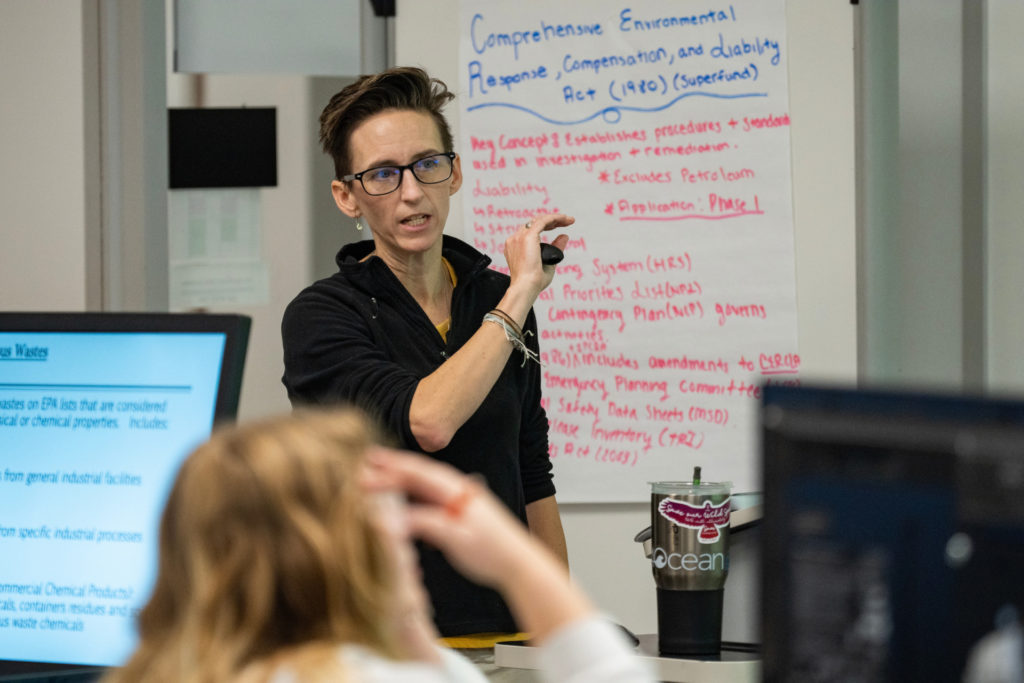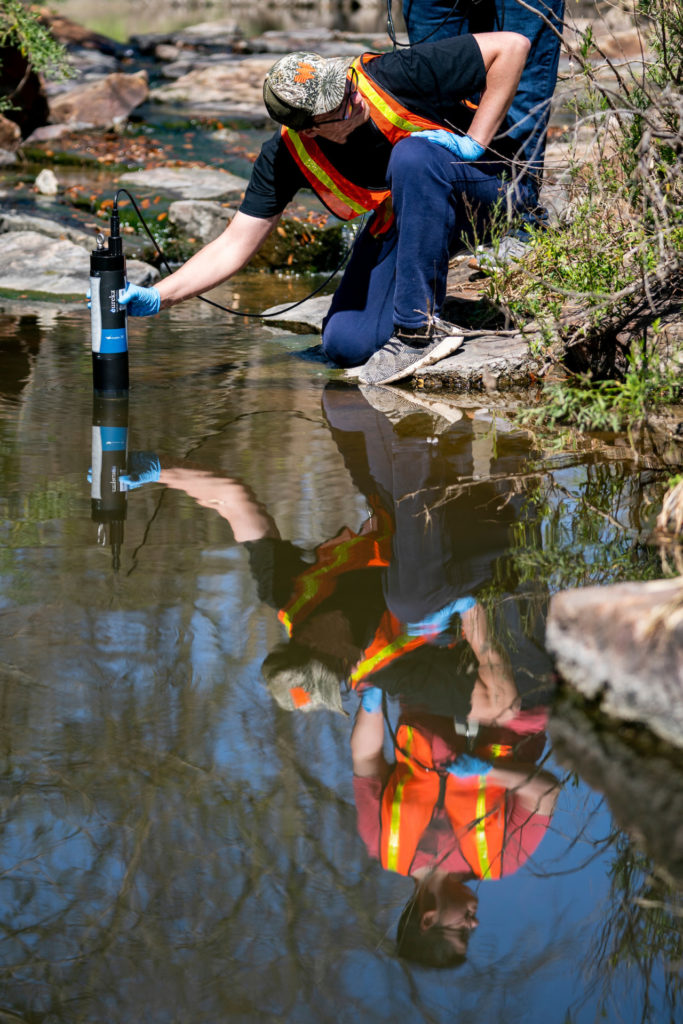A passion for teaching the bioenvironmental sciences
Through teaching, mentoring, Kati Stoddard prepares Texas A&M students to strengthen the environmental industry
When Kati Stoddard ’05 ’07 discovered her love for teaching, she gained clarity and purpose for how her career in bioenvironmental sciences could help her do her part to save planet Earth.

Stoddard, Ph.D., instructional associate professor and associate department head for undergraduate programs in the Texas A&M College of Agriculture and Life Sciences Department of Plant Pathology and Microbiology, PLPM, teaches and mentors students in the bioenvironmental sciences, BESC, program. Her award-winning, innovative teaching methods inspire and guide students to meaningful and successful careers across the environmental industry and in other fields as well.
A lifelong passion for the environment
Stoddard became interested in environmental issues in grade school. The time she spent outdoors camping and hiking with the Venturing program of the Boy Scouts of America cemented her passion for the environment. She knew her vocation would be dedicated to protecting and preserving the natural world and its resources.
To fulfill her mission, Stoddard became an environmental scientist. She earned a bachelor’s degree in bioenvironmental sciences and a master’s degree in water management and hydrological science, both from Texas A&M. She earned her doctorate in environmental science at the University of North Texas.
“An environmental scientist looks at environmental problems and solves them with systematic and scientific methods,” Stoddard said. “I’m very interested in personal motivations and why people make the environmental choices they do.”
During her master’s degree, she studied people’s motivation and willingness to pay to avoid exposure to environmental risk, specifically arsenic in drinking water. One of her doctoral studies focused on the characteristics of people willing to dispose of their unused or excess medications in an environmentally responsible way.
Finding her calling to save the environment through teaching
After completing her master’s degree, Stoddard worked as an environmental consultant. But it wasn’t until she began pursuing her doctorate that she discovered her passion for teaching.
“I enjoyed my consulting work, but it just didn’t feel like a calling,” Stoddard said. “While working on my Ph.D., I took a class on scientific teaching and worked as a teaching assistant for an environmental science course. Those two experiences made me realize I wanted to teach and mentor college students. I know I am not an engineer who will develop new energy sources or other sustainable innovations, but I also know I can fulfill my mission of helping save the planet and preserving the environment by educating others.”
An inclusive and holistic approach to teaching
Stoddard taught environmental sciences and served as the head of the Department of Biology at Texas A&M University-Texarkana before joining the BESC program in the Department of Plant Pathology and Microbiology at Texas A&M in College Station.

“My approach to teaching is evidence-based, engaging, student-focused and inclusive,” Stoddard said. “My goal is to help my students positively impact the environment, regardless of their major, by having a basic understanding of environmental science, the ability to think critically and to communicate scientific concepts clearly.”
The inclusive, respectful learning environment she creates makes students comfortable expressing themselves. Her teaching methods support diverse learning preferences and encourage critical thinking and academic achievement.
“Most students with disability accommodations find their unique needs are already met in my courses,” Stoddard said. “I’ve found the universal design features, such as providing all learning materials ahead of time in accessible formats and providing students unlimited attempts on online quizzes for the week they are due, help all students and foster deeper and more lasting learning.”
In recognition of her innovative teaching methods, Stoddard recently received the 2022-2023 Provost Academic Professional Track Faculty Teaching Excellence Award from Texas A&M for “exceptional teaching practices that create meaningful learning experiences for students.”
Other awards she has received include the Texas A&M Association of Former Students Distinguished Achievement Award for Teaching – College Level, the Plant Pathology Teaching Faculty of the Year Award from the Department of Plant Pathology and Microbiology, and the Interdisciplinary Studies-University Foundations Faculty of the Year Award from Texas A&M-Texarkana.
“Dr. Stoddard is an exceptional educator and embodies teaching excellence in our department, our College and Texas A&M University,” said Won Bo Shim, Ph.D., professor and interim department head of the Department of Plant Pathology and Microbiology. “Her passion and commitment to student-centered learning, science-focused coursework and hands-on technical experience make a lasting impact on preparing our students for their futures.”
Connecting students with industry professionals
Stoddard served as faculty advisor for the Texas A&M student chapter of the National Association of Environmental Professionals, NAEP. In NAEP, public and private sector environmental professionals help students learn about career opportunities and make industry contacts. As faculty advisor, Stoddard provided leadership training and mentorship to students and NAEP officers.
Stoddard said it is rewarding to use her expertise as an educator and an environmental scientist to help students launch professional careers and pursue their own goals in life.
For example, when pursuing her doctorate, she was delighted to discover her graduate student office mate, Cristi Gomez ’00 ’02, was also a former student from the Department of Plant Pathology and Microbiology’s BESC program in earning her bachelor’s and master’s degrees. She completed her doctorate a few years ahead of Stoddard, and they kept in touch.
Now senior director of regulatory safety and research and development compliance at Mary Kay Inc., Gomez is responsible for product regulatory compliance, product safety and toxicology.
“A lot of science goes into creating, developing, manufacturing and distributing cosmetics in 40 markets around the world,” Gomez said. “We have toxicologists, microbiologists and chemists on staff to ensure products are safe for people and the environment.”
Gomez has hired several BESC graduates, helped the BESC program and its students by speaking at NAEP meetings and had BESC students as interns.
Lauren Waters ’20 was an intern with Gomez’s team for two summers and joined Mary Kay Inc. when she completed her degree. She is a food and product safety scientist, and her responsibilities include ingredient review, product safety, sustainability, data management and cosmetic regulation.
Waters said she “became a fan” of Stoddard’s teaching and the BESC program when she took an introduction to BESC class her first semester in college. “I wouldn’t be where I am without them both,” Waters said of Stoddard and Gomez.
“I always wanted to take Dr. Stoddard’s classes because I knew they would be great,” Waters said. “She is not only an inspirational environmental professional and teacher; she’s also an amazing mentor and coach.”
Equipping students to make a difference
Stoddard said students like Waters are so important because the bioenvironmental sciences field will become even more relevant and essential.
“The environmental issues are real, and we need knowledgeable, skilled professionals to help solve these problems,” Stoddard said. “Our students will be able to find meaningful, well-paying jobs that make a real difference in the world.”
To learn more about bioenvironmental sciences in the Department of Plant Pathology and Microbiology, visit https://environmental.tamu.edu.


